PS5 vs. Xbox Series X: Which console wins?
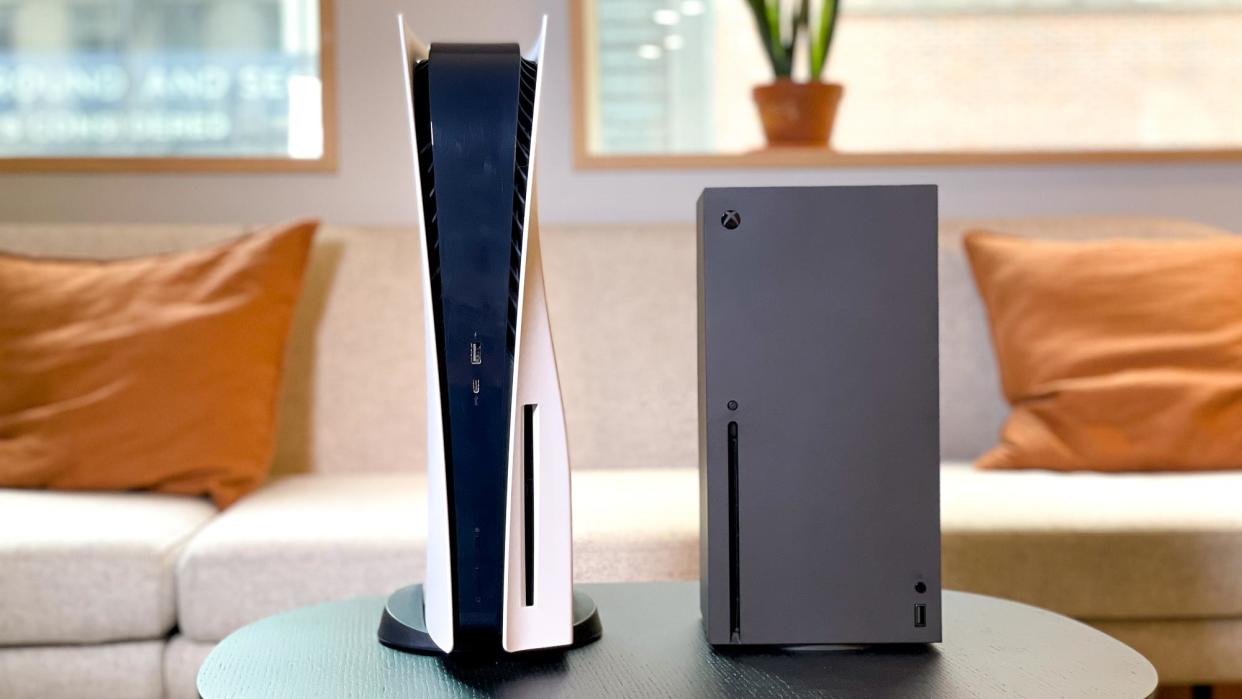
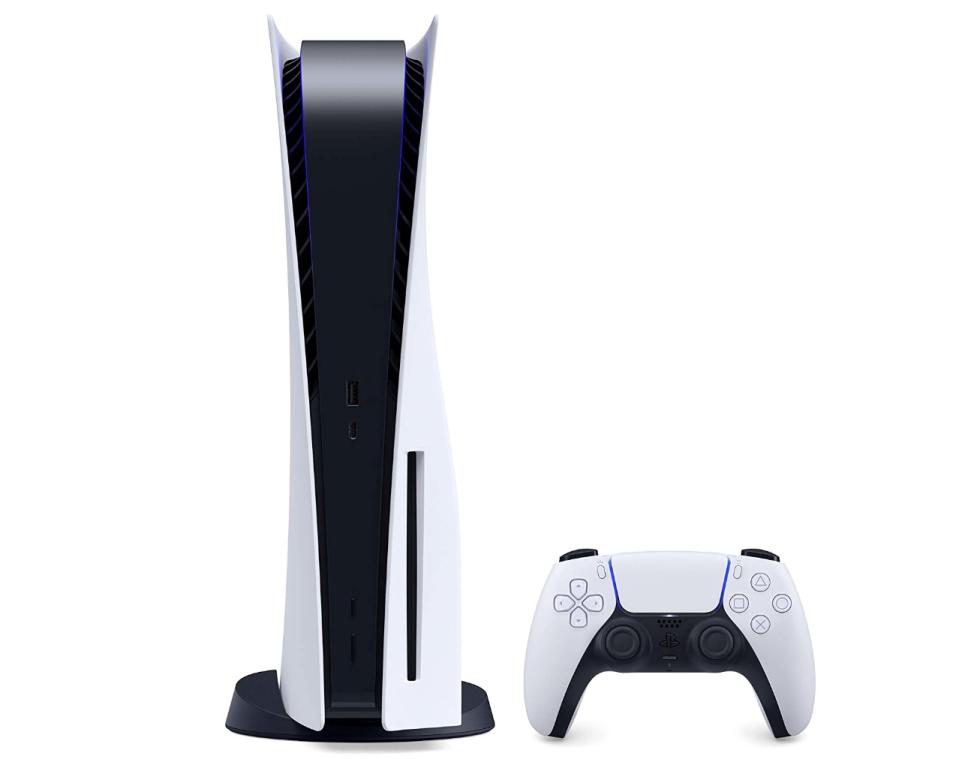
PlayStation 5
The Sony PlayStation 5 brings a bevy of must-play exclusive titles, such as Ratchet & Clank: Rift Apart and God of War: Ragnarok. The system features quick load times, in addition to high-resolution visuals and fluid frame rates. The DualSense controller features innovative haptics, but the console itself can be unwieldy. And even the PS5 Slim model doesn't entirely rectify its design issues. But it does sport a larger hard drive.
For
Incredibly fast SSD
Wildly inventive DualSense controller
Gorgeous 4K visuals
Against
Massive, unwieldy design
Controller may feel too big for some
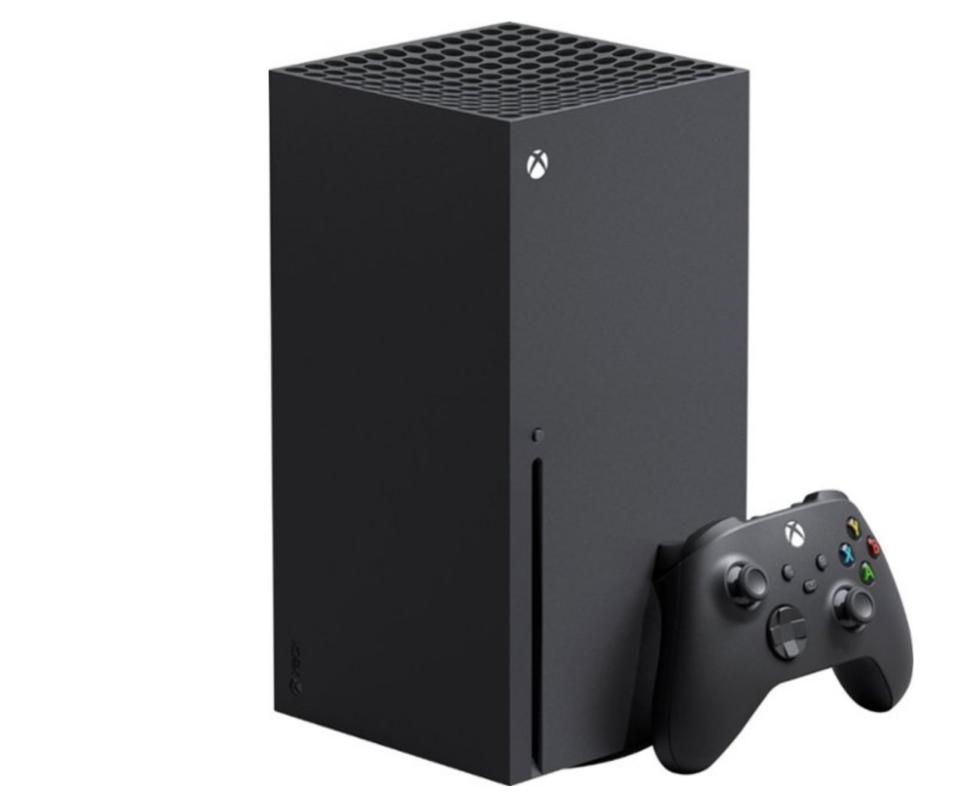
Xbox Series X
The Xbox Series X is the most powerful game console currently available, featuring detailed graphics, fluid frame rates and rapid load times. The device also sports a fantastic game library, with backwards compatibility going back to the original Xbox. With the Xbox Game Pass Ultimate subscription service, the Series X can be the centerpiece of a robust ecosystem, but first-party exclusives have been a mixed bag to date.
For
The only Xbox you need
Lots of power
Games load very fast
Against
Few quality exclusives
Large and heavy
It’s now more than three years since the launch of the ninth console generation, and the PS5 vs Xbox Series X battle rages on with fanboys on both sides eager to declare their chosen machine the superior hardware.
As our reviews explain, we were impressed with both consoles at launch, and over the last few years, things have only gotten better as both have been upgraded via system updates to iron out some of the initial kinks and add new features. Crucially, both Xbox Series X and PS5 offer a strong library of exclusive games alongside a wealth of third-party support.
If you have the luxury of buying both consoles, you’ll have everything you need for an epic gaming setup. But if you can only choose one, you'll want to find out which one is best for you. That’s why we're comparing the two consoles head-to-head, and without spoiling the results, even more than four years after release, it continues to be a very close contest between these two high-quality current-gen consoles.
Read on to discover how each system fares as we make our verdict on the PS5 vs. Xbox Series X debate.
PS5 vs. Xbox Series X: Specs
While the specs are handy to know, they only tell part of the story when it comes to performance. As such, this section isn’t scored. However, we can say that the Xbox Series X has more powerful hardware, in terms of both GPU and SSD. Check out the performance section to see how this hardware performs in action.
PS5 vs. Xbox Series X: Price
Both the PlayStation 5 and the Xbox Series X cost $499 apiece. Since the two systems are very similar, this category would seem to be a tie at first glance. However, the standard PS5 and Xbox Series X are not the only variants available. There’s also the $399 PS5 Digital Edition and the $299 Xbox Series S.
The PS5 and the PS5 Digital Edition are identical, save for a 4K Blu-ray physical disc drive in the former. The latter has no disc drive, as the name suggests. On the other hand, the Xbox Series S has significantly different hardware from the Xbox Series X: a less-powerful GPU, a smaller SSD, less RAM and so forth.
(You can see a more comprehensive breakdown in our Xbox Series X vs. Xbox Series S article.)
As such, both consoles have cheaper variants, and both the PS5 Digital Edition and the Xbox Series S have legitimate applications: the former for digital diehards, the latter for casual players or secondary setups. Still, since the Xbox Series S isn't merely a variation on the Series X, but rather its own separate console, it's a different proposition compared to the PS5 Digital Edition.
It should also be noted that both consoles are now been on store shelves long enough to see price cuts during seasonal sales events. During the Black Friday 2023 shopping season, the PS5 briefly dropped to $349 exclusively in-store at select Target locations, while the Xbox Series X fell to $349 with a copy of Diablo 4 included. However, neither has received a permanent price cut so both continue to retail for $499 outside of sales events, so there's nothing to do but declare this one a tie.
Winner: Tie
PS5 vs. Xbox Series X: Games
The PS5 and Xbox Series X game library are shaping up nicely as we pass the three-year mark. The PS5 boasts a bevy of high-quality exclusives, some of which are available on the PS4, while the Xbox Series X is a little weaker in this area. However, the gap is closing thanks to Microsoft's game-changing acquisitions of both ZeniMax media and Activision-Blizzard this generation.
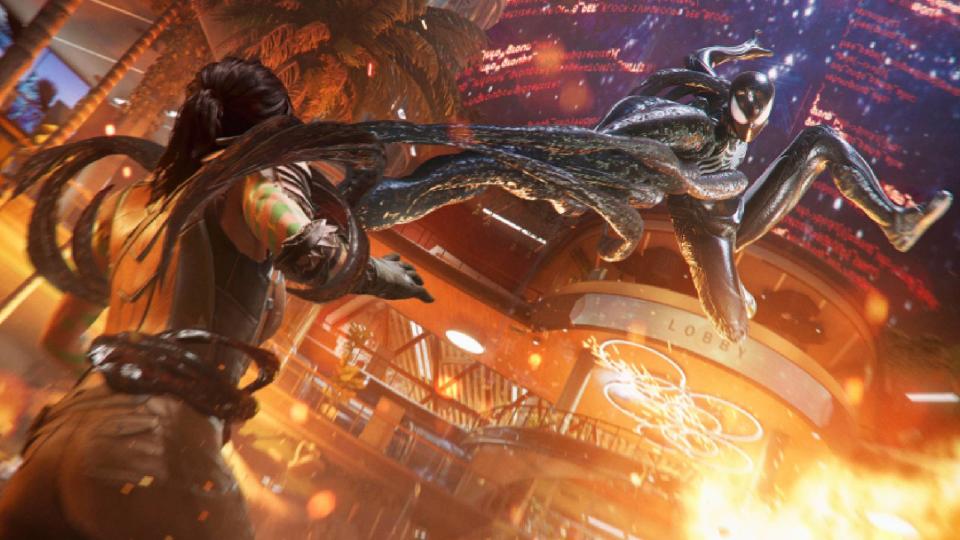
Nevertheless, at present, it’s hard to deny that the PS5 has the more exciting game selection. Just in terms of first-party titles, the PS5 launched with Spider-Man: Miles Morales, Demon’s Souls, Sackboy: A Big Adventure and the surprisingly delightful Astro’s Playroom.
And over the past three years, we've seen the arrival of Ratchet & Clank: Rift Apart, Returnal, Gran Turismo 7, Horizon Forbidden West and the mighty God of War: Ragnarok. Plus, throw in Marvel's Spider-Man 2 and Final Fantasy 16 which launched only on PS5 in 2023, and there's much more to come with The Last of Us Part II Remastered set to kickstart PS5's selection of new games in 2024.
Compare and contrast with the Xbox Series X, which didn’t have any exclusive titles at launch. Instead, Microsoft released a list of 30 “optimized for Xbox Series X/S” titles, including fan favorites like Gears 5, Ori and the Will of the Wisps and Forza Horizon 4. While the Xbox Series X optimizations are indeed impressive, not all of these games are brand new, and they’re all available on Xbox One, PC or both.
A handful of semi-exclusive Xbox Series X titles, such as Microsoft Flight Simulator, Halo Infinite and Forza Horizon 5 all showed off what the system is capable of, though. Even better, last year was the strongest year for the Xbox platform in terms of exclusive games to date with Starfield and Forza Motorsport 8 leading the charge. There was also Redfall in the Spring, but the less said about that particular game, the better.

Beyond that, both consoles are well-stocked with third-party titles, like Elden Ring, Assassin's Creed Mirage, EA Sports FC 24, Star Wars Jedi Survivor and lots more. Strong third-party parity is likely to continue throughout the generation. Both systems also have excellent backwards compatibility features, although I'll get to that down below.
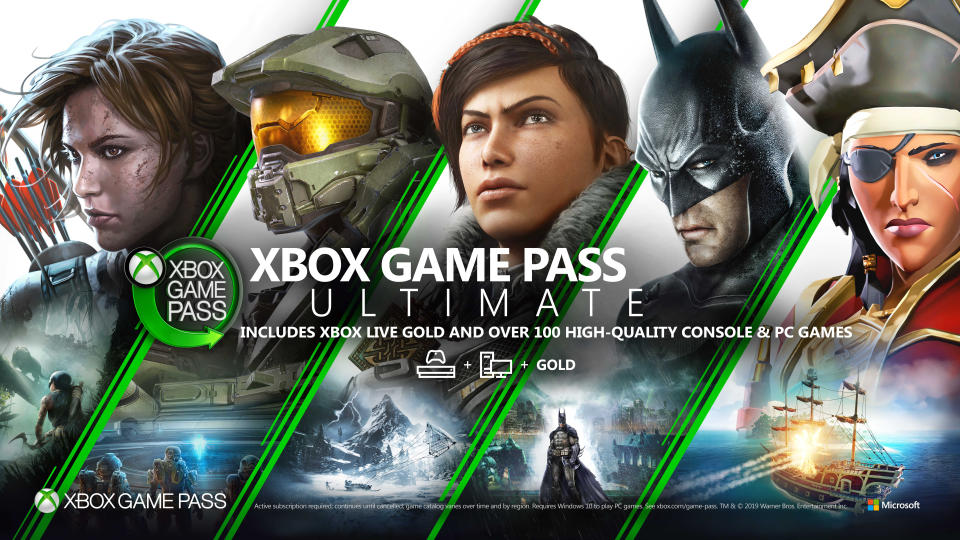
It’s also worth mentioning Xbox Game Pass Ultimate, to which Sony doesn’t currently have a perfect answer. This $17-per-month subscription service lets you download more than 100 games across a variety of genres, and play them on Xbox Series X, Xbox Series S, Xbox One, PC and even Android.
Sony, meanwhile, has the PlayStation Plus Premium tier, which offers hundreds of games to download and/or stream from the PS1, PS2, PS3, PS4, PS5 and PSP platforms. The functionality is not nearly as refined as Game Pass, but the raw game library is bigger, so take it for what it's worth.
Of course, both systems will also have some interesting games coming down the line. But restricting ourselves to what we can play and review right now, the PS5 has the stronger lineup, but the Xbox Series X is quickly making up ground on this front.
Winner: PS5
PS5 vs. Xbox Series X: Performance
Comparing PS5 and Xbox Series X performance is difficult at present, as Tom's Guide does not have the specialized equipment required to measure resolution and frame rate in great depth.
Bearing that in mind, I compared two games qualitatively across both systems: Assassin’s Creed Valhalla and Devil May Cry 5: Special Edition. The former is a huge open-world title, where it’s easy to measure load times as you fast travel from one distant point of the map to another. The latter is a fast, frenetic action game, where any drop in framerate is immediately noticeable.
First: Sony’s ambitious claims about the PS5’s load times aren’t exaggerated, as far as I can tell. Assassin’s Creed Valhalla went from the main menu into the game in less than a minute; fast travel took less than 10 seconds from point to point. However, while the Xbox Series X took longer to load the game initially (almost a minute), fast travel time was exactly the same.
Gameplay-wise, if you handed me an ambiguous controller and put either the PS5 or Xbox Series X version of Assassin’s Creed Valhalla on a screen in front of me, I honestly wouldn’t be able to tell the difference. Both systems ran the game at 4K at 60 frames per second (although I understand that the 4K is probably upscaled in both cases), and neither one seemed to have any major difference in animation fluidity, lighting, etc. Texture pop-in seemed a little more noticeable on the Xbox Series X, although that may have just been the area I was in.
Devil May Cry 5: Special Edition told a similar story, although this time, I was able to discern some slight differences in the lighting. While both the PS5 and Xbox Series X offer ray tracing, the Xbox Series X’s ray tracing in this game was a little richer, offering greater contrasts between light and shadow, particularly in the game’s early, eerie red-and-purple landscapes. (Digital Foundry found the same thing, with some stats to back it up.) The Xbox Series X also seemed a little bit smoother when I turned on the 120 fps performance mode, although again, I’d be hard-pressed to tell the two titles apart if I didn’t know which one was in front of me.
Evaluating performance with these two games is difficult, however, because they were both designed with PS4 and Xbox One in mind rather than PS5 and Xbox Series X exclusively. While I can also talk about how impressive games like Spider-Man: Miles Morales and Gears 5 looked, they’re not possible to compare directly.
For now, I can say that the two consoles both perform extremely well, although the PS5 has slightly shorter loading times.
Winner: PS5
PS5 vs. Xbox Series X: Design
For the most part, whether you like a console’s design comes down to personal preference. But my personal preference is that I cannot stand how the PS5 looks.
Not only is the system comically large; but it’s also a pain to switch from vertical to horizontal configuration, and the standard version sports an ugly, asymmetrical design. Even after sitting under my TV for three years, the PS5 still looks awkward. Adding to my frustrations, the front panel is prone to fingerprints and the “power” and “disc eject” buttons are indistinguishable, which is a minor gripe but annoying.
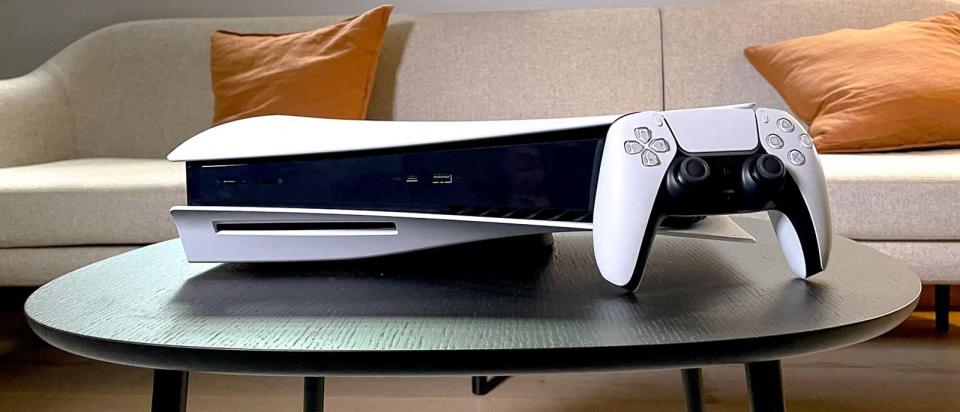
Last year, Sony released a redesigned version of the PS5 console that was dubbed the PS5 Slim by online commentators — although Sony has never officially given it that branding.
It shrinks the size of the console by some 30%, which at the very least makes it a slightly less cumbersome console to fit into your entertainment center. However, the overall design aesthetic is the same, so it’s just a smaller version of an already unattractive console.
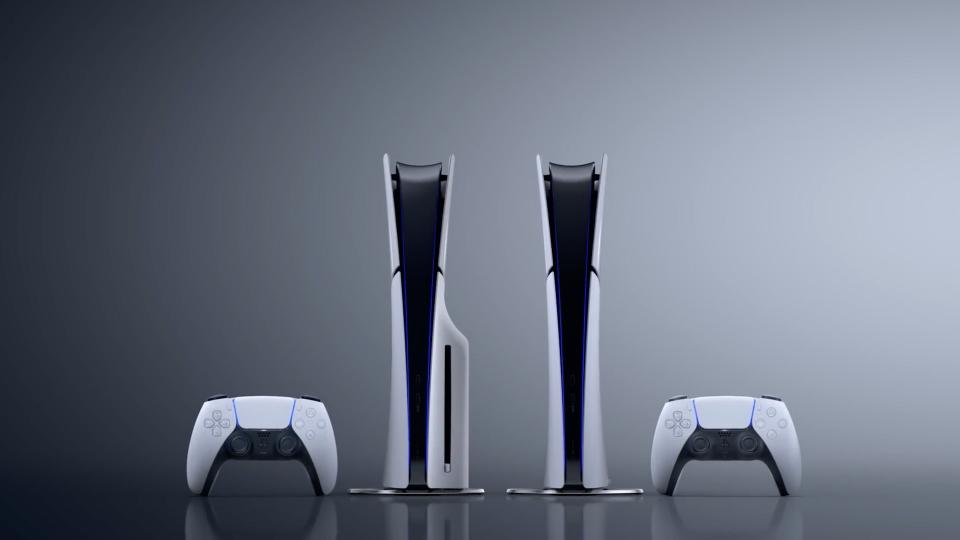
It also packs a few additional upgrades including a larger SSD (now 1TB instead of 825GB), and an external disc drive that is detachable. That means you can buy a Digital Edition and add an Ultra HD Blu-ray Disc Drive at a later date, so long as you’re willing to pay $99 for one.
Unfortunately, the PS5 Slim also comes with a few downgrades, most noticeable is that a vertical stand is no longer included as standard. While you get a basic horizontal stand in the box, if you want to securely place your PS5 console upright you’ll need to spend an additional $25, or buy a cheaper third-party alternative, if you’re willing to risk compatibility issues.
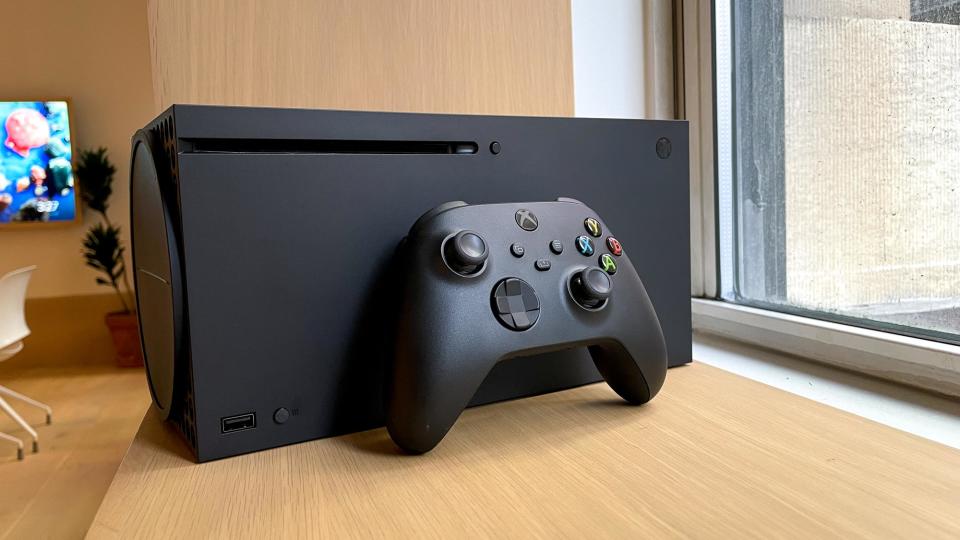
The Xbox Series X, on the other hand, is still pretty bulky but manages its space much better. Rather than looking like an oversized router, the Xbox Series X is a sleek black box that looks, at least in its vertical form, kind of like a small tower PC (or a tiny refrigerator). It has a clearly defined power button, as well as a pairing button to make wireless connections painless.
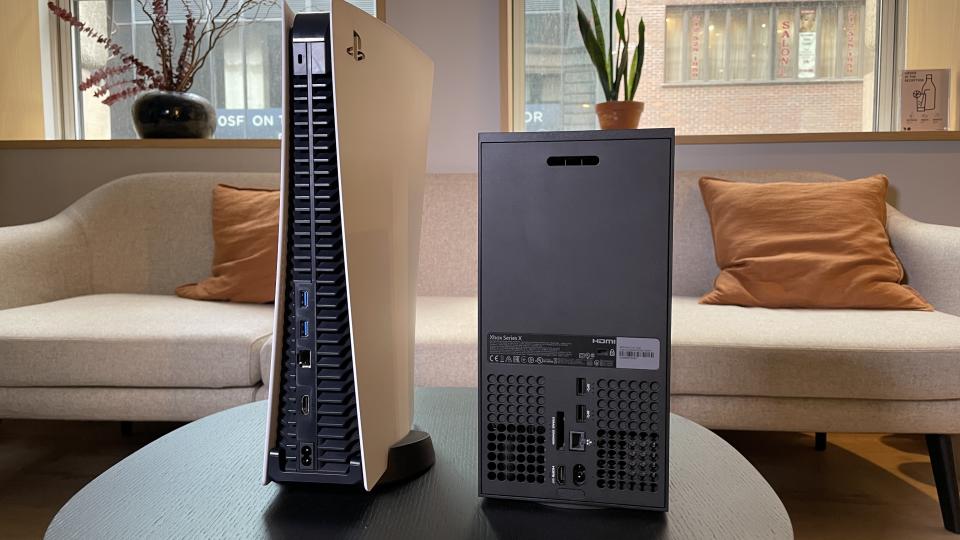
The only big advantage the PS5 has over the Xbox Series X is the presence of a USB-C port — which is a big deal, especially as more accessories get USB-C adapters. But even if the Xbox Series X design is much more conservative, it’s also much more sensible overall. And even the PS5 Slim cannot tip the needle in Sony's favor here.
Winner: Xbox Series X
PS5 vs. Xbox Series X: Controller
Another area in which the Xbox Series X plays it safe, to its credit, is in its controller. The Xbox Series X controller is nearly identical to the Xbox One model, save for textured grips and shoulder buttons, an improved D-pad and a new “share” button in the center.
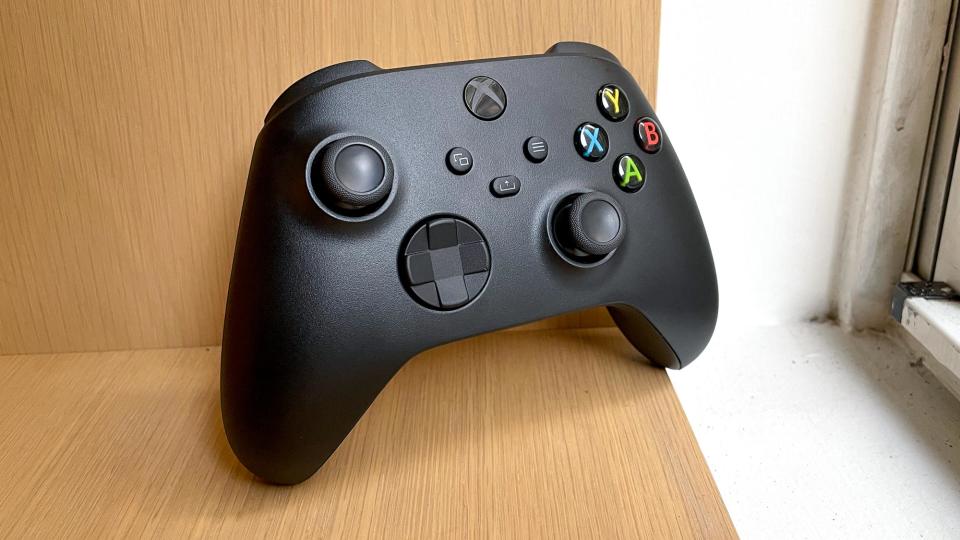
It’s a smart upgrade for one of the best controllers ever made. Still, the fact that it runs on AA batteries instead of a built-in rechargeable unit feels positively archaic, and also pasts a lot of cost onto the end-user, whether they choose to buy AAs or rechargeable packs.
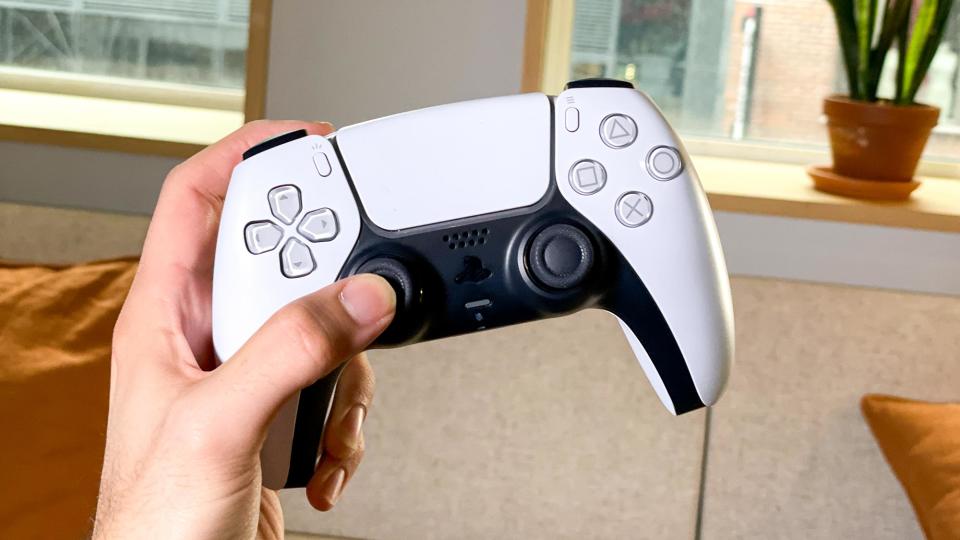
The PS5 DualSense, on the other hand, is a big departure from the DualShock 4, with a two-tone color scheme and much bigger grips. It also adds a variety of new features: extremely sensitive haptics and a built-in mic among them.
The haptic feedback is impressive, mimicking the feel of objects rolling around in a box, or putting up realistic resistance when you push a trigger. However, the DualSense still has a ton of wasted space (particularly in the touchpad), and the enjoyment you'll get from the haptics is a matter of personal preference.
PS5 owners looking to level up their gaming might also want to consider investing in the DualSense Edge. It’s a highly customizable version of the standard DualSense sporting metallic back buttons, swappable sticks and a sturdier design. All these new upgrades come at the hefty price of $120, and the controller’s already weak battery life takes a hit. You can expect around five hours from a full charge of the Edge.
Winner: Tie
PS5 vs. Xbox Series X: Backwards compatibility
Both the PS5 and the Xbox Series X have excellent backwards compatibility features, but there’s no denying that the Xbox reaches further back into Microsoft’s library. Not only is the Xbox Series X compatible with just about every Xbox One game; it’s also compatible with many Xbox 360 and original Xbox games. While it doesn’t include every stab Microsoft’s ever taken at backwards-compatible games (the Xbox 360 still plays many original Xbox games that the Series X can’t), it’s an impressive effort with zero friction.
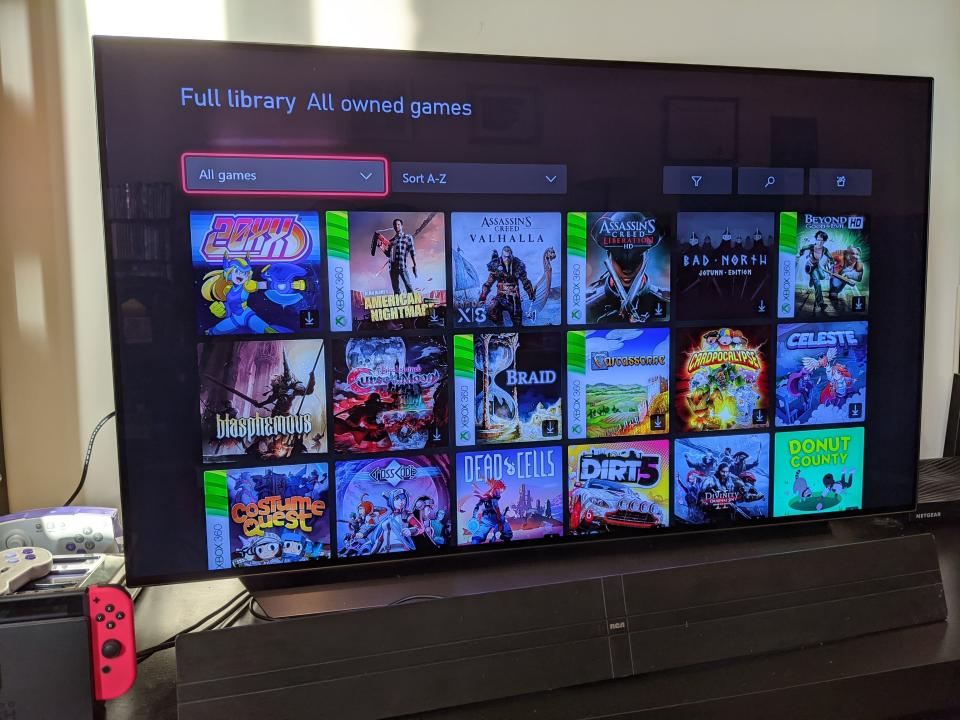
The PS5 can play just about every PS4 game on the market, but compatibility doesn’t go back any further than that unless you count the ability to stream a very small selection of PS3 games via PlayStation Plus Premium. Still, it’s not quite the same as playing games you already own directly on a console.
Winner: Xbox Series X
PS5 vs Xbox Series X: Cloud gaming
Cloud gaming isn’t a huge issue for either the PS5 or the Xbox Series X, since you can simply download games and play them natively on either platform. But as cloud gaming grows over the next few years, it’s good to know where each company stands at the outset of this console generation.
The PS5 has the PlayStation Plus revamp, which lets you stream a variety of PS3 titles, as well as some PS4 titles, to PlayStation consoles and PCs. It costs $10 per month for a tier that includes streaming capabilities.
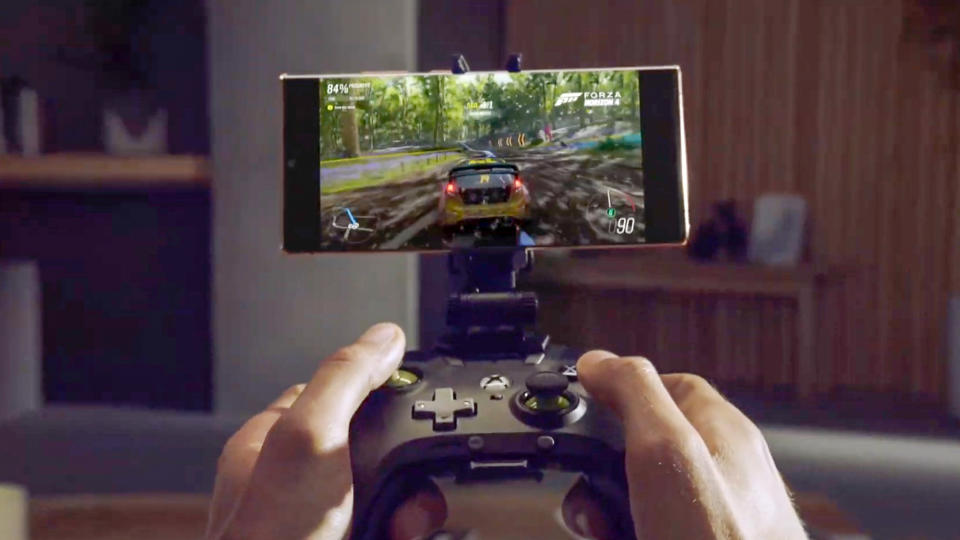
The Xbox Game Pass Ultimate, as discussed above, costs $15 per month, and lets you stream games to Android, iOS, non-gaming PCs and even Xbox consoles.
While the PlayStation Plus revamp has some potential, Xbox Cloud Gaming is currently a much more refined and functional service.
Winner: Xbox Series X
PS5 vs Xbox Series X: Verdict
At this point in their lifecycle, both PS5 and Xbox Series X represent an excellent investment. The Xbox Series X has a slight edge when it comes to raw power, design and backward compatibility, but the PS5 is the leader in arguably the most important category of all as it boasts a game library that Xbox simply cannot match at present.
Perhaps the key determining factor between the two comes down to whether you want access to a more comprehensive game subscription service. Xbox Game Pass simply cannot be matched for its value and the fact that flagship exclusive land on the service day one. Meanwhile, if you don’t mind buying new games ala carte, then PS5 is the clear winner as its library of exclusives is of the highest quality.
Plus, the PS5 also offers access to next-gen virtual reality tech via the PS VR2 headset accessory. Currently, Microsoft does not have an equivalent VR product of its own for Xbox users. There are also strong rumors of a PS5 Pro refresh arriving in 2024, which could be another boost to Sony’s gaming platform.
From having used both consoles extensively over the last few years, my gut feeling is that they have more similarities than differences, and whichever one you get should be more than sufficient to power your gaming for the next few years. Of course, you could always just build a gaming PC — but that’s a different story.
PS5 vs. Xbox Series X: Buy now or wait?
Now that both consoles have been out for almost three years, we'd say they are worth buying. While you won't find many discounts on the PS5 or Xbox Series X outside of seasonal sales events, they both have a solid range of games and accessories to use with them, and we are now reaching a point where new games aren't released on older hardware anymore, meaning getting an Xbox Series X or PS5, or indeed both, now makes a lot of sense for dedicated gamers.

